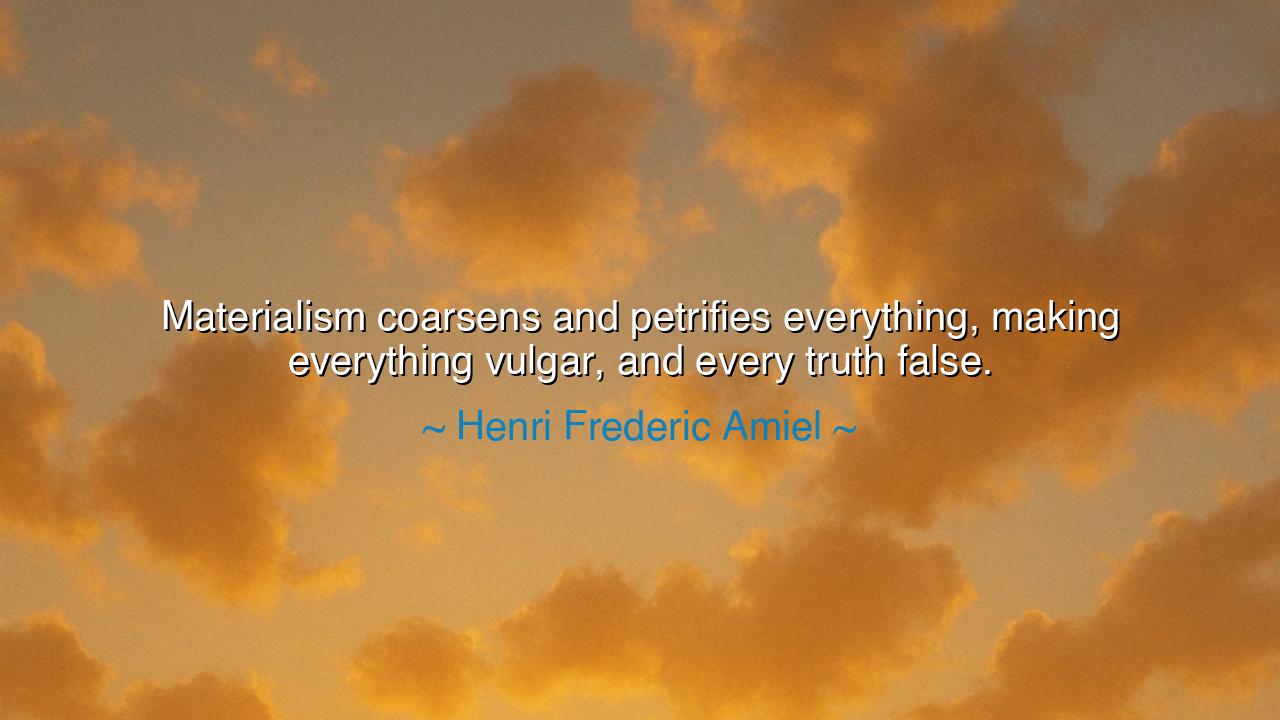
Materialism coarsens and petrifies everything, making everything
Materialism coarsens and petrifies everything, making everything vulgar, and every truth false.






Hear the solemn words of Henri Frédéric Amiel, who declared: “Materialism coarsens and petrifies everything, making everything vulgar, and every truth false.” In this utterance lies a cry of warning, a lament for the soul of mankind. For materialism, the worship of possessions, wealth, and the visible alone, is not harmless—it is a poison. It hardens the heart, dulls the spirit, and corrupts the nobility of truth. What should be sacred becomes trivial; what should be pure becomes tainted; what should be eternal is dragged into the dust of vulgarity.
The meaning of this saying is clear: when life is measured only by gold, by comfort, by the fleeting satisfaction of the senses, then even the highest things lose their glory. Love becomes transaction, friendship becomes convenience, faith becomes superstition, and truth itself is twisted into falsehood. For truth cannot be bought, nor can it be sold; yet materialism seeks to clothe it in price and profit, stripping it of its living essence. To live only for matter is to petrify the soul, turning what was once living and supple into stone.
The ancients feared this decline. The philosophers of Greece saw that when cities grew rich, they also grew corrupt. Plato warned that a society driven only by wealth becomes enslaved by appetite, unable to seek wisdom or virtue. Rome, too, fell not only by the sword of enemies, but by the rot of materialism within—its citizens grew fat on luxury and spectacle, forgetting duty, justice, and truth. The empire that once ruled the known world became vulgar and hollow, until even its truths seemed false. Amiel, centuries later, echoed this same wisdom, seeing in his own age the creeping triumph of material obsession.
Consider the story of Marie Antoinette and the French aristocracy before the Revolution. Surrounded by glittering wealth and endless indulgence, they became blind to the suffering of the common people. The grandeur of their court was vulgar because it was hollow, a monument to materialism that mocked the truth of human dignity. When the people rose, the illusions of wealth were shattered. The truth of inequality and injustice, long buried beneath luxury, emerged with fire. Yet because materialism had twisted the noble truths of governance and responsibility into falsehood, the fall was bloody and merciless.
The danger is not only for nations, but for the soul of each individual. A man consumed by materialism begins to see even his relationships as possessions, his virtues as commodities, his very self as nothing more than matter. He grows coarse, unable to feel the finer movements of the spirit. His laughter becomes vulgar, his pleasures shallow, his wisdom empty. He may gain the world, but in doing so he petrifies his heart. The truths of love, beauty, and faith seem to him foolish, because materialism has rendered him blind to them.
What lesson then shall we take? Beware of living for wealth alone. Guard your heart against the creeping coarseness of materialism. Remember that riches and possessions may serve the body, but they cannot feed the soul. Seek instead to cultivate spirit: love that gives without price, wisdom that shines without profit, truth that stands beyond all market. For when your heart loves truth for its own sake, it will remain supple, living, and radiant.
Therefore, O seeker of tomorrow, do not let your life be petrified by materialism. Live generously, cherish beauty, honor truth even when it costs you. Let wealth serve, but never rule. For Amiel has warned us: materialism makes every truth false. If you would live in truth, you must live beyond the prison of matter, lifting your soul toward what is eternal. Then you will not be coarse or vulgar, but noble, radiant, and free.






ATTran Phuoc Anh Thien
This quote brings up an important concern about the cultural emphasis on materialism today. If everything becomes about acquiring more, how can we find clarity and purpose? Does our obsession with wealth and possessions numb us to the more intangible truths about human connection, creativity, and purpose? How do we shift away from materialism to embrace values that allow us to see and experience deeper truths?
THLe Thi Thanh Hoa
Amiel’s words suggest that materialism not only cheapens life but also clouds our ability to see truth clearly. It raises an interesting question: Can material success and spiritual fulfillment coexist, or is one bound to overshadow the other? Is it possible for society to value both material wealth and deeper truths, or must one always take precedence over the other?
NNhi
This quote challenges the way we view success and happiness. Amiel suggests that materialism turns everything vulgar and distorts the truth. But, does the quest for material wealth always lead to this outcome, or can it be a tool for positive change and progress? How do we find balance between enjoying material comforts and maintaining an honest, meaningful connection with the world around us?
QTAnh Quan Tran
Amiel’s quote makes me reflect on how materialism can cloud our judgment. If we view everything through the lens of what it can provide us materially, can we ever see the truth of something? How often do we see people prioritizing wealth and status over authenticity? Is it possible for materialism to exist in balance with maintaining a sense of deeper truth, or are the two fundamentally incompatible?
HNHieu Nguyen
I find this quote thought-provoking because it speaks to the dehumanizing effects of materialism. If everything becomes about acquiring or owning, then what happens to our values, emotions, and connections? Can a society focused on material wealth still foster genuine truths and meaningful relationships? Or does the pursuit of material success inevitably compromise our deeper understanding of what’s truly important in life?